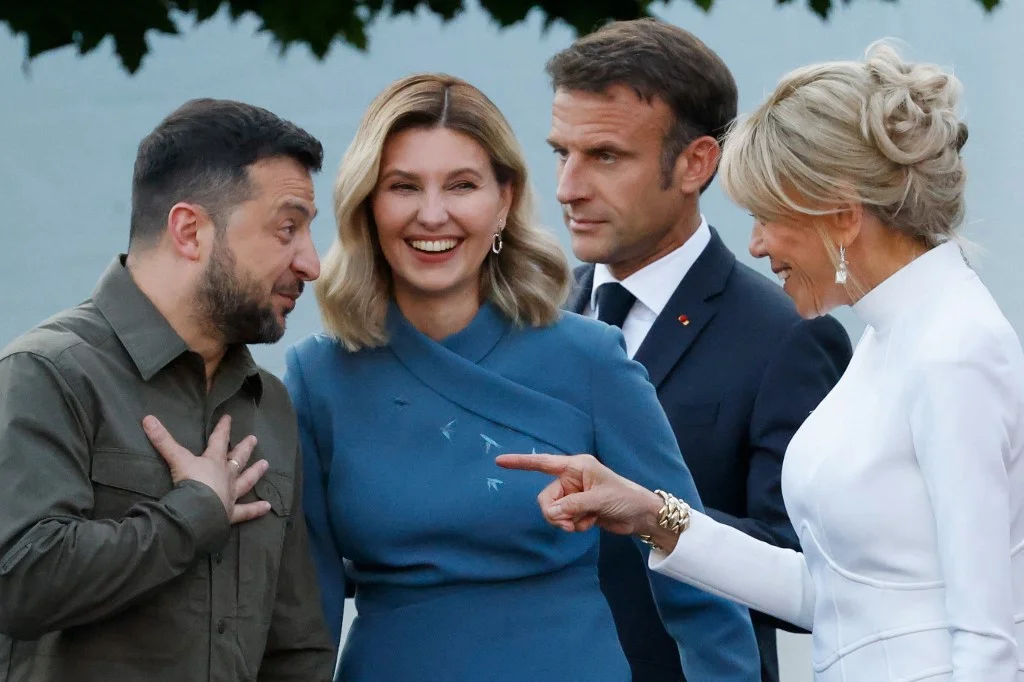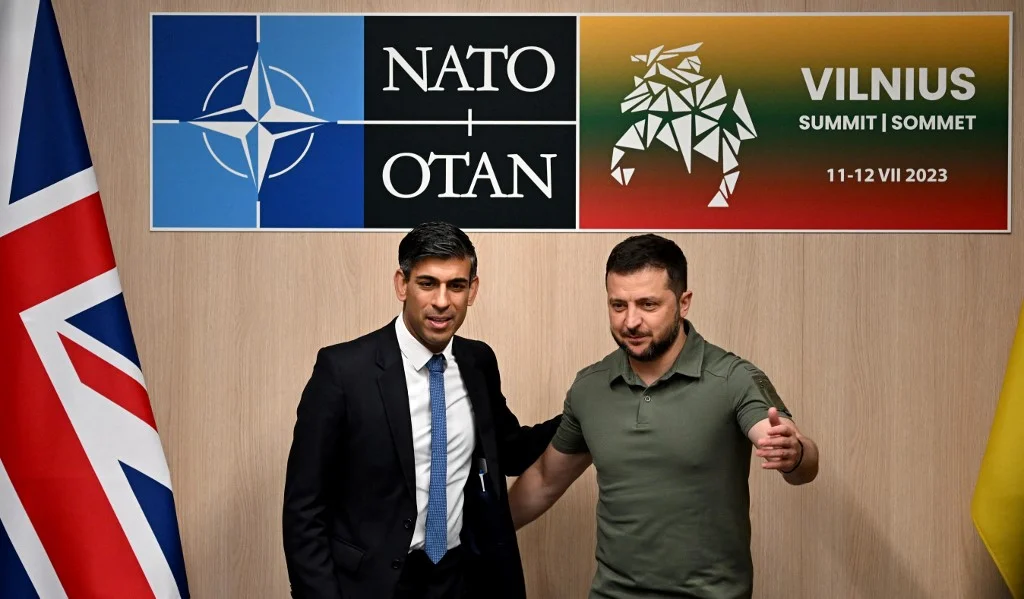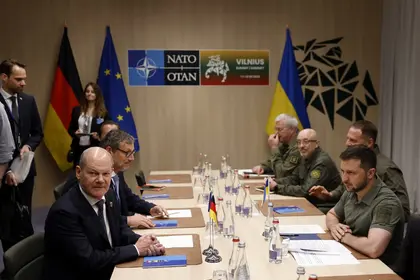Western powers put forward their proposals for long-term security commitments to Ukraine on Wednesday after NATO dashed President Volodymyr Zelensky's hopes of a clear timeline for Kyiv’s accession to the alliance.
Zelensky held symbolic talks with NATO's 31 leaders at their summit in the Lithuanian capital Vilnius, a day after blasting them for not moving faster to bring Ukraine into the fold.
JOIN US ON TELEGRAM
Follow our coverage of the war on the @Kyivpost_official.
US President Joe Biden hailed Ukraine's "astounding" courage Wednesday in talks with Zelensky, who set aside earlier frustrations with NATO to profusely thank the United States for its help.
"You set an example to the whole world when it comes to genuine courage," Biden told Zelensky in Vilnius, where they attended the NATO summit. "Not only all of you but your people – your sons, your daughters, your husbands, your wives, your friends: you're incredible."
Biden said that Russia's military, which launched its devastating invasion of swaths of Ukraine last year, was acting "like something out of the 14th century."
Following tensions at the Vilnius summit over NATO's rejection of Ukrainian pressure to be given accelerated membership in the alliance, Biden acknowledged the "frustration" sometimes felt by Zelensky.
"But I promise you: the United States is doing everything we can to get you what you need as rapidly as we can get it to you," Biden said.
"The bad news is we're not going anywhere. You're stuck with us," he joked.

President Zelensky’s ‘Ramstein’ Address to Ukraine’s Allies
Here are the main developments from today so far…
The G7’s long-term plan
G7 nations on Wednesday pledged to offer "enduring" military support to Ukraine to help it fight Russia's invading forces and stop any repeat of the war once it ends.
"We will each work with Ukraine on specific, bilateral, long-term security commitments and arrangements towards ensuring a sustainable force capable of defending Ukraine now and deterring Russian aggression in the future," the G7 said in a statement.
Ukraine's international backers are looking to reassure Kyiv on their support after military alliance NATO refused to offer the war-torn country an invitation to become a member.
The group of seven leading democracies – the United States, Britain, France, Germany, Italy, Canada and Japan – said they would look to agree on providing Ukraine's forces with "modern military equipment, across land, air, and sea domains".
That would mean "prioritising air defence, artillery and long-range fires, armoured vehicles, and other key capabilities, such as combat air," the statement said.
The global powers said that they would offer to provide swift military and financial assistance to Ukraine "in the event of future Russian armed attack".
They would also look "to impose economic and other costs on Russia" if it launched another war once this conflict is concluded.

Ukraine's President Volodymyr Zelensky (L) and his wife Olena Zelenska react next to France's President Emmanuel Macron and French President's wife Brigitte Macron on Tuesday evening. PHOTO: AFP
Zelensky says commitments no substitute for membership
Speaking on Wednesday afternoon, Zelensky welcomed new security commitments from the G7 powers on Wednesday, but warned that these could not be a substitute for eventual NATO membership.
Speaking after talks with NATO Secretary General Jens Stoltenberg, Zelensky said the G7 promises should be seen "not instead of NATO, but as security guarantees on our way to integration".
"We can state that the results of this summit are good, but should we receive an invitation, then that would be the optimum," he said at NATO's summit in Vilnius.
Drones and missiles from Norway
Norway said Wednesday it would supply ultra-light drones and components for air defence missile systems to Ukraine, specifying details for a military aid package announced this week.
On Tuesday Norway announced it was increasing the size of its military aid to Ukraine this year, adding an additional 2.5 billion kroner ($240 million).
This means Oslo will allocate 10 billion kroner to military aid and 7.5 billion to civilian support this year, rather than the 7.5 billion initially planned for each.
Following up on Wednesday, Defence Minister Bjorn Arild Gram specified that the aid would consist of 1,000 Black Hornet nanodrones – tiny drones designed to help soldiers scout out their surroundings – and components for NASAMS surface-to-air missile systems, to complement the systems of this type that Lithuania plans to deliver to Ukraine.
In addition, the Scandinavian country would donate tens of thousands of food rations.
No Taurus missiles from Germany
German Defense Minister Boris Pistorius has said his government will not provide Ukraine with long-range Taurus cruise missiles, despite other European countries supplying Kyiv with similar weapons.
Speaking on the sidelines of the NATO summit, he said: “If individual partners do this [supply long-range missiles], this is their sovereign decision.
“We do not intend to change our position.”
The missiles, produced by a Germany-Swedish joint venture Taurus Systems, would allow Ukraine to strike well inside Russia with their range of more than 500 kilometres (310 miles).
Seeking to head off criticism of the decision, Pistorious highlighted that Germany had already provided Ukraine with weapons such as the Patriot air defense system.
“Without us, the air defense of Ukraine would have been impossible at all,” he said.
Russia marks day 2 with another drone attack
Ukraine said on Wednesday it had shot down 11 Russian drones overnight in a second consecutive night of attacks on the capital Kyiv, as NATO leaders prepared to meet with President Volodymyr Zelensky in Vilnius.
“A total of 15 kamikaze drones were involved in the strike. Eleven of them were destroyed in the areas of responsibility of the Centre and East air commands,” Ukraine's air force said on social media.
The statement did not say if other drones were shot down in other parts of Ukraine. Igor Taburets, governor of Cherkasy region in central Ukraine, said two people were hospitalized with burns after a drone hit a non-residential building, sparking a fire.
“Cherkasy was on alert for more than three and a half hours,” he said. Kyiv military authorities said there was also a drone attack on the capital but did not say how many drones were involved.
“All enemy targets in the airspace around Kyiv were detected and destroyed,” it said on social media, adding that there were no reports of victims or damage.
The air raid alert in Kyiv lasted for more than two hours. On the first day of the NATO summit on Tuesday, Ukraine said Russian attack drones had targeted grain facilities at a southern port in the Odesa region.
The Ukrainian military said on Tuesday it had downed a total of 26 Russian attack drones in the latest barrage.

Britain's Prime Minister Rishi Sunak (L) and Ukrainian President Volodymyr Zelensky are pictured during a bilateral meeting on the sidelines of the NATO Summit in Vilnius, Lithuania, on July 12. PHOTO: AFP
The press conference
Following a bi-lateral meeting between Jens Stoltenberg and Volodymyr Zelensky, the two leaders held a press conference just prior to the inaugural meeting of the new NATO-Ukraine council.
Zelensky said he understood that Ukraine’s partners had made sacrifices to support Ukraine but they should remember this is about the “survival” of his country and his people.
The new path to NATO membership sent a signal to Russia which Zelensky likened to Ukraine's candidacy for EU membership telling the Kremlin that Ukraine was and will remain an independent state.
Stoltenberg added, in response to a question from Sky News, that Moscow does not get to decide who is in NATO. Asked if the decisions taken at the summit have brought NATO closer to a war with Russia, he said that there's already a fully-fledged war in Europe which meant there was “no risk-free option” for NATO and its members.
“The biggest risk is if President Putin wins, because then the message is if you use military force, when he violates international law, when he invades a neighbor, then he gets what he wants,” the Secretary general added.
“We can never allow that Moscow starts to decide who can and cannot be a member of NATO. Russia has been against every enlargement of NATO.
“It's for NATO allies and Ukraine to decide when to become a member, Moscow doesn't have a veto on that.”
More angry Russian reaction
Top Russian officials have accused Kyiv and its allies of bringing humanity closer to World War 3 and prolonging the war in Ukraine in some eyebrow-raising reactions in response to the first day of the NATO summit in Vilnius.
While Zelensky expressed frustration that no firm timetable for his country joining the military alliance was laid out, his anger was dwarfed by that coming out of the Kremlin.
Dmitry Medvedev, the deputy secretary of Russia’s powerful Security Council, went into full-hyperbole mode, saying: “The completely crazy West could not come up with anything else... In fact, it’s a dead end. World War Three is getting closer.
“What does all this mean for us? Everything is obvious. The special military operation will continue with the same goals.”
You can read more about that story here.
Later on Wednesday, Kremlin spokesman Dmitry Peskov said security guarantees from Western powers for Ukraine would undermine Russia's security and "will make Europe much more dangerous for years and years."
"By giving security guarantees to Ukraine, they are undermining the security of the Russian Federation," Peskov added.
This story will be updated throughout the day…
You can also highlight the text and press Ctrl + Enter






